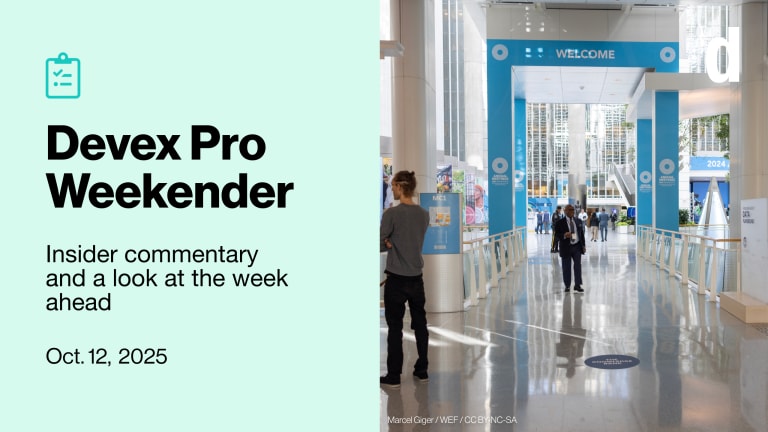Islamic Development Bank looks to expand its support of innovation and entrepreneurship

WASHINGTON — The Islamic Development Bank annual meetings are underway this week in Tunisia, and one of the themes being discussed is social innovation.
Leading some of those discussions is Dr. Hayat Sindi, the chief scientific adviser to the president of the Islamic Development Bank.
“Social innovation helped me see a clear vision of the complex world,” she told the crowd at the annual meeting, as she discussed the importance to harnessing innovation and technology in the service of solving the world’s problems.
Earlier this year, Dr. Hayat Sindi, the chief scientific adviser to the president of the Islamic Development Bank, went on a roadshow to meet with nongovernmental organizations, startups, governments, and universities to test the water and raise awareness about a pair of new Islamic Development Bank initiatives aimed at youth, technology, and innovation.
The bank recently launched Transform, a multimillion dollar fund that will work to promote and nurture science, technology, and innovation. Alongside the new fund, it has also launched a digital platform, Engage, to accelerate economic and social progress in the developing world through science technology and innovation.
“The fund is really catered to be a strategic catalyst, to bring the right tools to local communities so they will be able be in charge of [their] own future.”
— Dr. Hayat Sindi, chief scientific adviser to the president of the Islamic Development BankSindi, who spoke to Devex following her learning tour earlier this year, said she was surprised to see a lot of the younger generation engaged in trying to make a better society, she said, adding that women in particular were “taking the charge, resonating with the [Sustainable Development Goals], and wanting to create something.”
While some countries have a more advanced innovation or entrepreneurship ecosystem, there are still inequalities, she said. Entrepreneurs told Sindi they want guidance and mentorship, and they need protection, connectivity to other innovators and global investors. The Engage platform will aim to serve some of those purposes.
See more related topics:
► Scale X Design: Is this the accelerator the aid sector needs?
► How blended capital can help entrepreneurs make it through the missing middle
► What developing countries can learn from India's entrepreneurship ecosystem
The Transform fund will look to fund outside the box initiatives focused on key SDGs including water, energy, education, food security, and health, and will be available to grantees in the 57 countries where the bank works, Sindi said.
“The fund is really catered to be a strategic catalyst, to bring the right tools to local communities so they will be able be in charge of [their] own future,” she said. The goal is to create sustainable economic growth, encourage inventorship, and help with commercialization, Sindi added.
The fund will offer several types of funding: Proof of concept funding to help support scientists and others to develop ideas and prototypes; scale funding to help young entrepreneurs grow and find partners or donors; commercialization capital to help scale; and funding to help build human capacity and human capital in innovation ecosystems.
Each of the pots of funding will have different criteria, but Sindi has said that she is mindful that some of the criteria need to be relaxed.
Transform is a $500 million fund, of which $200 million has been raised. It has not determined how much it will spend each year, as it will depend on demand, Sindi said. The first round of applications opens at the end of the month and the deadline is the end of August. The window is intentionally long, Sindi said, so that the fund can work with young entrepreneurs on their applications and provide them with the tools, support, and business model help they may need to complete the applications.
While there isn’t an explicit target for lending to women, the fund and platform are designed to give opportunities to both genders, she said. Personally, she’s also working on other bank efforts to empower women to be engineers or inventors.
“I know it’s tough because most women don’t resonate with that world, they want to be a doctor because you see your impact quickly,” she said. Sindi urges universities to better tell the story of technology and the power it has to solve social issues and have a human impact, which women seek out, she said. If not, the world is “missing their empathy, talent, passion, and emotion,” Sindi said.
Part of what the fund and the Islamic Development Bank more broadly will be working on is engaging governments and key decision-makers to create appropriate strategies and policies to foster innovation and entrepreneurship. Already, there are many requests from countries asking for help on creating the right policies, Sindi said.
There has been a lot of fragmentation in the entrepreneurship or innovation space, which the Engage platform, which is free and open to all, will try to address by better aligning and connecting innovators and providing them with the right tools, she said.
These latest initiatives are part of the bank’s focus on science, technology, and innovation and since the bank’s strategy was adopted a few years ago, there has been a shift at the bank.
“We are definitely looking to be sustainable, looking to have an impact on communities,” she said. “The whole mindset is different, more refined, more visionary, more aligned with the mission of bank and aligned with all sectors of the bank,” Sindi said.
Search for articles
Most Read
- 1
- 2
- 3
- 4
- 5






